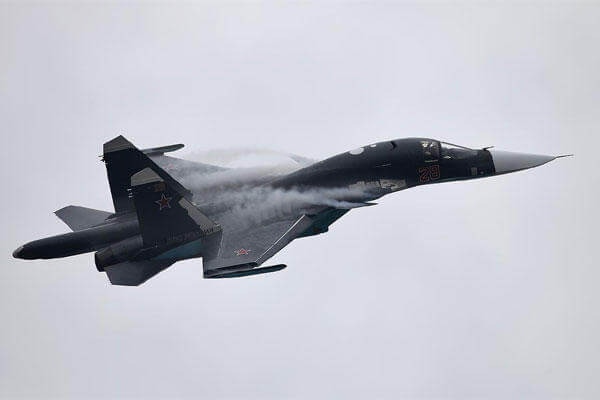Russia announced Monday that a class of its fighter-bombers in Syria has been armed for the first time with air-to-air missiles for "defensive purposes" in a move that posed a potential risk to U.S. and coalition warplanes flying missions against the Islamic State.
The provocative action followed warnings from Russian President Vladimir Putin that Turkey would pay a price for shooting down last week a Russian Su-24 Fencer frontline bomber in which a Russian pilot was killed and a Russian marine died in a rescue attempt near the Turkish-Syrian border.
The U.S. has six air superiority F-16C fighters at the Incirlik airbase in Turkey that could counter the Russians, but those aircraft have seen limited duty, Pentagon officials said.
The F-16Cs were originally sent to Incirlik in October with the intention of helping the Turks guard their airspace, but the F-16s "have not to date flown any CAPs (Combat Air Patrols)," said Navy Capt. Jeff Davis, a Pentagon spokesman.
The Russian resort to air-to-air missiles "has not had any impact on our operations but it’s certainly something we’re aware of," he said.
In Moscow, Igor Klimov, a spokesman for the Russian Air Force, said, "Today Russian Su-34 (Fullback) fighter-bombers have made their first sortie equipped not only with high explosive aviation bombs and hollow-charge bombs, but also with short and medium-range air-to-air missiles, the Russian news outlets Tass and RT reported.
'"The planes are equipped with missiles for defensive purposes," Klimov said, but the missiles were "capable of hitting air targets within a 60 kilometer (37.3 mile) radius."
The F-16Cs are equipped with "beyond visual range" Advanced Medium-Range Air-to-Air Missiles, or Amraams, and AIM-9 Sidewinder missiles with a range of 22 miles.
Turkey charged that the Russian Su-24 crossed into Turkish airspace on Nov. 24 and ignored at least 10 warnings to leave the area before it was shot down by a Turkish F-16.
Russia claimed that the jet had remained in Syrian airspace and charged that the Turkish F-16 fired without warning.
Lt. Col. Oleg Peshkov and Capt. Konstantin Murakhtin ejected from the Su-24 "but Lt. Col. Peshkov was killed in midair by gunfire opened by militants from among the ethnic Turkmens," Tass reported.
In addition to arming planes with air-to-air missiles, the Russians have also said that advanced, long-range S-400 surface-to-air missiles were being deployed to Syria to protect the Russian air fleet.
Lt. Gen. Charles Brown Jr., commander of U.S. Air Forces Central Command, said last week the S-400 systems also could pose a threat to the coalition.
"Yes, it does complicate things a little bit, and we’ll put some thought to it, but we still have a job to do here, and we’re going to continue to do that job ... to defeat Daesh," Brown told Air Force Times, using another term for the Islamic State in Iraq and Syria, or ISIS.
The shoot down came as the U.S. and France escalated strikes against ISIS in the aftermath of the Paris terror attacks that killed 130.
The U.S. has committed to deploying about 50 Special Forces troops to northeastern Syria in non-combat roles to advise Kurdish and Syrian-Arab fighters seeking to expand areas they control along the Turkish-Syrian border.
At the Pentagon, Capt. Davis would not confirm foreign press reports that the Special Forces troops had arrived in Syria. "We’re not going to be providing specifics on their itinerary or their whereabouts," Davis said.
In Paris, where world leaders assembled for talks on climate change, President Obama and Putin met on the sidelines. The White House said that Obama "expressed his regret for the recent loss of a Russian pilot and crew member and reiterated the United States' support for de-escalation between Russia and Turkey."
In later remarks, Putin said Turkey had made a "huge mistake" by shooting down the Su-24 and he renewed Russia’s charges that the incident was related to Turkey’s alleged need to protect the oil supplies it gets from ISIS.
"We have received additional data which confirm that Islamic State oil ... enters the territory of Turkey," Putin said. "The decision to shoot down the plane was dictated specifically by a desire to defend supplies."
Turkish President Recep Tayyip Erdogan has angrily rejected charges that Turkey gets oil from ISIS and called such allegations "slander."
--Richard Sisk Can be reached at Richard.Sisk@military.com






























